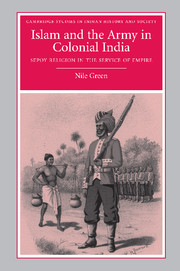Book contents
- Frontmatter
- Contents
- List of illustrations
- Preface and acknowledgements
- A note on terminology
- Glossary of Urdu and Anglo-Indian terms
- Map Nizam's State and its cantonment towns
- Cambridge Studies in Indian History and Society
- Introduction
- 1 Traditions of supernatural warfare
- 2 The padre and his miraculous services
- 3 Allah's naked rebels
- Conclusions
- Notes
- Bibliography
- Index
2 - The padre and his miraculous services
Published online by Cambridge University Press: 29 July 2009
- Frontmatter
- Contents
- List of illustrations
- Preface and acknowledgements
- A note on terminology
- Glossary of Urdu and Anglo-Indian terms
- Map Nizam's State and its cantonment towns
- Cambridge Studies in Indian History and Society
- Introduction
- 1 Traditions of supernatural warfare
- 2 The padre and his miraculous services
- 3 Allah's naked rebels
- Conclusions
- Notes
- Bibliography
- Index
Summary
A fakir (a religious well known in the East,
Not much like a parson, still less like a priest)
Richard Owen Cambridge, The Fakir (1756)The life and life of Afzal Shāh
Almost everything that is known about the life of Afzal Shāh Biyābānī (d. 1273/1856), a nineteenth-century Muslim faqīr attached to the sepoys of the Hyderabad Contingent, is found in an Urdu biography entitled Afzal al-karāmāt that was completed in 1331/1913 and published shortly afterwards. Afzal al-karāmāt was written by Muhyī al-dīn Darwēsh Qādirī (d. 1362/1943), the son-in-law of Afzal Shāh's son and heir Sarwar Biyābānī (d. 1331/1913). In a very real sense, what Muhyī al-dīn was writing was not folklore but history, albeit a history constructed on its own epistemological foundations. The main focus of Afzal al-karāmāt was a holy man who had died almost sixty years before its completion, so its main sources of information were Afzal Shāh's surviving sepoy disciples and his son Sarwar Biyābānī (d. 1331/1912). Even in his use of such oral sources, Muhyī al-dīn only relayed stories concerning figures whose families were known to his local readership, a selective use of oral tradition that offered both a mechanism and rhetoric of authentication by relying (in the spirit of Hadīth scholarship) on ‘respectable’ informants belonging to Hyderabad's military and landowning classes.
- Type
- Chapter
- Information
- Islam and the Army in Colonial IndiaSepoy Religion in the Service of Empire, pp. 31 - 89Publisher: Cambridge University PressPrint publication year: 2009



